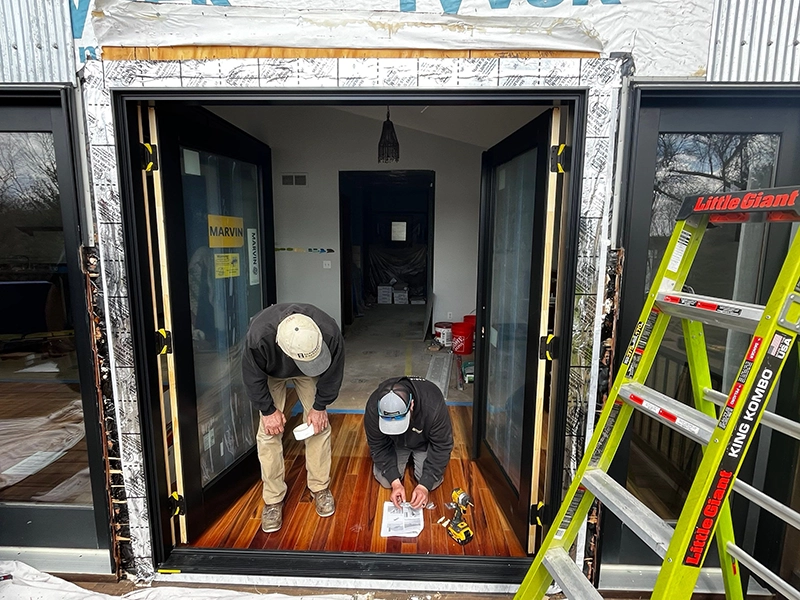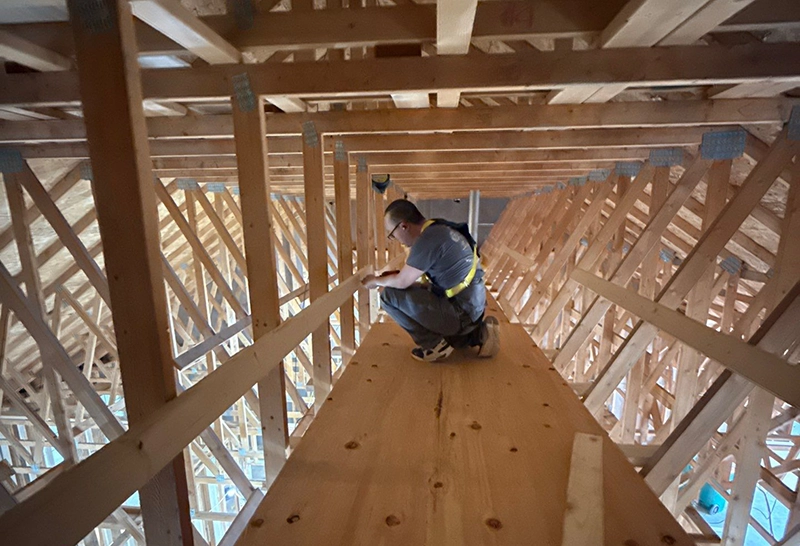Unfortunately, home and business property owners have experienced increasing problems with property claim settlements the last several years. There are reasons for this. For more information about this, and insights into what’s involved in the claims settlement process, check out our June 2024 blog “How Lindstrom Restoration Champions Customer Advocacy in Insurance Claims.” It’s an informative read. This blog will concentrate more on what policyholders can do if their claim is either unduly delayed (“stuck”) or wrongfully denied.
The problems we see today in insurance claims are troublesome. Insurance industry members won’t be happy to read this, but Lindstrom’s research and experience find that many policyholders have not been receiving the service and payouts they are entitled to. Delays and denials have been much more common in recent years, and Lindstrom is one of many contractors experiencing problems. Meanwhile, local, long-time respected independent adjusters agree with us (most, off the record), as do many industry professionals and observers.
Appraisals, a claim dispute resolution remedy authorized by Minnesota State Law, are at an all-time high. Veteran appraisers, umpires, attorneys, and reputable public adjusters all report that some insurance claim operations have changed dramatically for the worse. They tell us that too many adjusters are undertrained and inexperienced. They also speculate that heavy losses over the last few years have resulted in more claim denials. Nearly everyone agrees on one thing. These developments are unprecedented. Unfortunately, policyholders are bearing the brunt of the pain.
To be accurate and fair, a good many claim settlements are going well, and some carriers are living up to their service and payment obligations. Lindstrom Restoration gives the insurance industry high marks historically, and so do most veteran insurance agents and adjusters. Lindstrom employees have worked almost exclusively with property insurance claims since our family-run company was founded in 1953. We’ve worked on thousands of losses over the decades, with many insurance carriers, so we’re qualified to make valid observations.
It’s our job as a contractor to work cooperatively with policyholders and their insurance company agents and adjusters for the best interests of policyholders. For well over half a century, the vast majority of claims have gone well, insurance companies have been generous in their claims settlement payouts, and consumer satisfaction has been high. To be sure, the time and hassle of dealing with an insurance claim is never fun, but in the end, we can count many happy policyholders. Our goal at Lindstrom has always been to put people back in their homes and businesses, as soon as we possibly can, to their pre-loss condition with “like materials.”

But things have changed. Delays have been common. It all begins by filing an insurance claim. The home or business owner consults with their insurance agent and makes the decision to file or not. Once submitted, the insurance adjuster investigates and makes the decision to accept the claim or deny it. What should you do if you file a claim and delays are unacceptable?
- Call Your Insurance Agent First:
- Ask your agent when you can expect an insurance adjuster to call you: Minnesota State Law requires an insurance company to contact you within 10 business days of the receipt of the claim. Some agents will also call the adjuster’s supervisor to speed things up. Other agents won’t or are not allowed to take things up the organizational chain of command.
- Work with the Adjuster Next:
- Once the carrier receives the claim, future communications are with the insurance company staff adjuster or through an authorized independent adjuster. If the adjuster is not returning your calls or the claim gets unduly delayed, again, call your agent back to see if they can speed up the process. Your chosen contractor can also make a call or two, but it is not in the contractor’s best interest to “bug” the adjuster and create an adversarial relationship.
- Hire a Public Adjuster:
- If your agent and contractor can’t get results, you may wish to hire a public adjuster (see information below) who can legally represent you. Your insurance agent and contractor can advocate on your behalf, but by law, cannot legally represent you. So, they are limited in what they can do.
- Public adjusters can be more effective at getting a claim unstuck, since they have an independent relationship and know what recourse they have when calls are not being returned timely. Some insurance agents prefer to stay out of the claim process and concentrate on writing new business. There are also carriers that encourage their agents to limit claims involvement. Contractors can’t burn bridges with adjusters as they will likely work with them again on future claims. Public adjusters can be much more effective in getting the ball rolling.
- You’ll get little or no help from a typical direct marketing insurance carrier that doesn’t assign permanent agents to policyholders. At those companies, you’re limited to just claims personnel. Public adjusters can be particularly effective in these situations.

Once the active claims settlement process resumes and the adjuster investigates the damage, a decision to either approve or deny the claim will be made. As mentioned previously, increasingly, claims are now being met with an insurance adjuster’s denial. Professional contractors like Lindstrom want to do the job right, for a cost that will give them a reasonable profit. Adjusters may disagree with that. Or they won’t authorize work that should be legitimately done. For instance, a homeowner believes they have a hail-damaged roof, but the insurance adjuster’s inspection reveals insufficient damage to justify replacement. What should a home or business owner do if they disagree with a denial?
1. Review and Understand the Denial
- Request a detailed explanation from the carrier. Ask your insurance company for a written explanation of the claim denial, including the specific policy language that supports their decision.
- Compare that with your policy. Once you have the carrier’s explanation, carefully review your insurance policy to understand the coverage details and determine if the denial aligns with the policy terms. Ask your insurance agent to assist you in this process. An experienced and reputable public adjuster can also be very effective in interpreting coverage since many are property insurance experts.
- Make sure you have legitimate damage. Get at least a couple of inspections from reputable contractors, either chosen by your research or vetted by your insurance agent. An expert, such as a roofing engineer’s opinion is best, although they will charge a fee to conduct the inspection. Given the cost of roofs these days, that might be worth it.
2. Engage in Direct Communication
- Call your insurance agent first. Some agents get involved in claims and others do not. If you are fortunate to have one that will advocate for you, discuss your options with him or her first. They often have insights into the process, and good advice for the next steps you should take.
- Contact your insurance company adjuster. Reach out directly to your adjuster to discuss the denial. Request a clear explanation and consider negotiating if you believe the denial is unjustified. You have the right to ask for a reinspection. The insurer, in that case often assigns a more experienced adjuster to do the second inspection.
- Document all interactions: Keep records of all communications with your insurance company, including dates, times, and the names of representatives you speak with.
3. Seek External Assistance
- File a complaint with the Minnesota Department of Commerce. If you’re unable to resolve the issue with your insurer, you can file a complaint with the Minnesota Department of Commerce. They can assist in mediating disputes between consumers and insurance companies.
- Online: Submit a complaint through the Consumer Complaint Portal
- Phone: Call (651) 539-1600 or (800) 657-3602 for assistance.
- Email: Send inquiries to consumer.protection@state.mn.us
- Mail: Send written complaints to:
Minnesota Department of Commerce
Attn: Consumer Protection & Education Division
85 7th Place East, Suite 280
St. Paul, MN 55101
4. Consider Professional Help
- Hire a public adjuster: A licensed public adjuster can evaluate your losses, manage the claims process, and legally negotiate with the insurance company on your behalf. They are experts in insurance coverage, very experienced in calculating your owned property and contents, and have skilled negotiation skills. They typically work on a contingency fee basis, receiving a percentage of the settlement. For more information on public adjusters and their role in the insurance process, check out this website: https://www.iii.org/article/what-public-adjuster
- “Nerd Wallet,” the highly respected personal consumer finance site and App, discusses public adjusters on their website: https://www.nerdwallet.com/article/insurance/public-adjuster-insurance
- Only consult with reputable, ethical, and licensed public adjusting companies. Your contractor or insurance agent may be able to recommend vetted public adjusters.
- Consult an attorney: If the dispute remains unresolved, consult with and possibly hire an attorney experienced in insurance claims. Many offer free initial consultations and may work on a contingency fee basis. Ensure the attorney is licensed in Minnesota and has good standing with the Minnesota Bar Association.
5. Utilize the Appraisal Clause
- If there’s a disagreement over the value of the loss, your policy includes an appraisal clause under Minnesota State Law. https://mn.gov/commerce/insurance/home/residential-claim/ This allows both you and the insurer to hire independent appraisers who then select an umpire to resolve the dispute. This process can be a less adversarial and more cost-effective alternative to litigation.
- You can get assistance in doing an appraisal from your insurance agent, or someone who can legally represent you such as a public adjuster or attorney firm. Minnesota Community Associations Institute (CAI) member Hellmuth & Johnson explains the process further: https://www.cai-mn.com/page/MCL_091011_rights/Know-Your-Rights-What-Every-Property-Owner-Should-Know-About-Making-an.htm
- Remember if you go to appraisal, you must document your case strongly. Expert opinion will be needed to back up your case.
6. Maintain Thorough Documentation
- Keep detailed records of all aspects of your claim, including:
- Photographs and videos of the damage.
- Receipts for repairs or temporary accommodations.
- All correspondence with your insurance company.
- This documentation can be crucial if you need to escalate the dispute or seek legal assistance.
Navigating a challenging insurance claim can be stressful, but by taking these steps, you can take charge of your situation and negotiate a fair and equitable resolution.

Leave a Reply